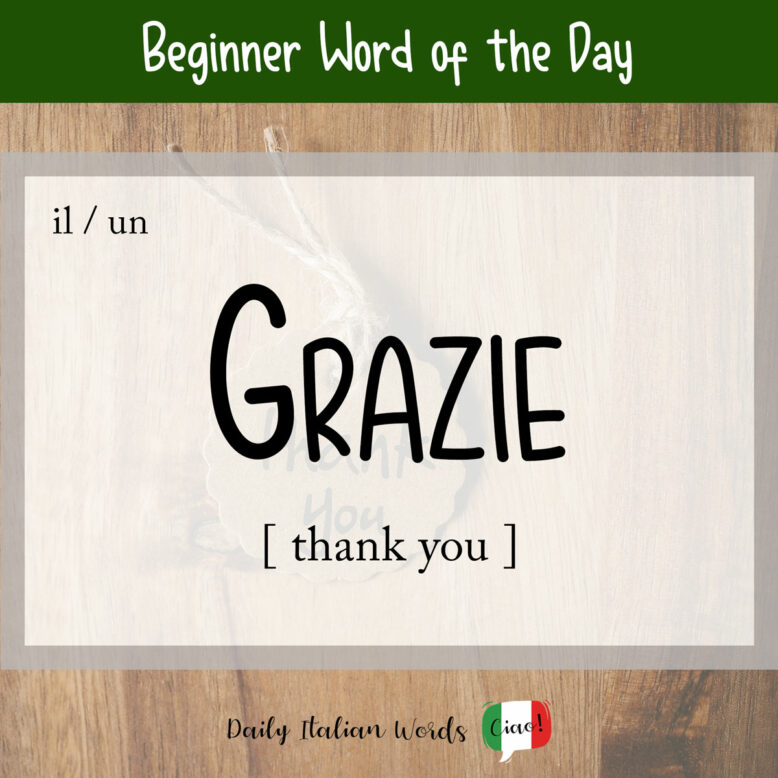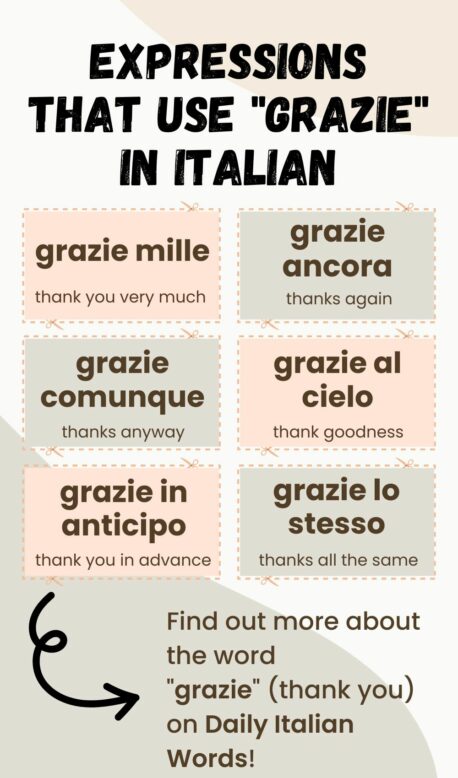This week, we’ve chosen a classic Italian expression with which I imagine the vast majority of you are already very familiar! 🙂

Grazie! is the equivalent of Thank you! or Thanks! in Italian. It is the plural of the noun grazia which literally translates as grace, gracefulness, favour or generosity depending on the context.
Ricordati di dire grazie, sempre.
Always remember to say thank you.

Two prepositions that serve to introduce a noun or verb after grazie are per (for) and di (of). For the most part, they can be used interchangeably (as explained on the Zanichelli Dictionary website), although many Italians may have a preference for one or the other.
Grazie di avermelo detto.
Grazie per avermelo detto.
Thank you for telling me.
Grazie della tua risposta.
Grazie per la tua risposta.
Thank you for your response.
Grazie di essere te stesso.
Grazie per essere te stesso.
Thank you for being you.
Grazie dei bellissimi fiori!
Grazie per i bellissimi fiori!
Thank you for the beautiful flowers!
Two notable exceptions are the crystallised expressions grazie di tutto (thank you for everything) and grazie di cuore (a heartfelt thanks) in which per cannot substitute di.
When followed by the preposition a, it denotes a consequence, result or reason just like the English expression thanks to.
Grazie alla generosità di Paolo, possiamo cavarcela anche questo mese.
Thanks to Paolo’s generosity, we can get through this month too!
In response to a proposal or offer, we tend to say yes, please and no, thank you in English whereas in Italian, grazie is used for both the positive and negative response.
Vuoi una fetta di torta?
Do you want a slice of cake?
Sì, grazie!
Yes, please!
No, grazie.
No, thank you.
A few additional expressions you might find useful in daily conversation are:
- grazie mille / grazie tante = thank you very much
- grazie e arrivederci = thank you and goodbye
- grazie ancora = thanks again
- grazie di nuovo = thanks again
- grazie comunque = thanks anyway
- grazie lo stesso = thanks anyway / all the same
- grazie a Dio = thank God
- grazie al cielo = thank goodness
- grazie in anticipo = thank you in advance

Did you know that…?
Grazie is the ellipsis of the expression ‘Vi rendo grazie‘ (I give you thanks) and became widespread in 19th century spoken Italian. Source: Accademia della Crusca

The verb: Ringraziare
The way you would say to thank in Italian is with the verb ringraziare.
Ho ringraziato Marco per averci preparato la cena.
I thanked Marco for preparing the dinner.
However, when used with the direct pronouns ti / vi / La, the best translation in English is often just thank you.
Ti ringrazio per il tuo tempo.
(I) thank you for your time.

‘Grazie’ as an ironic / sarcastic response
Something many learners of Italian don’t realise is that grazie can also be used ironically in response to the obviousness of a statement as in the example below. Some possible English translations include it’s not surprising, of course, and no wonder.
Pietro si è comprato una Ferrari? Grazie, con tutti i soldi che ha!
Pietro bought a Ferrari?! – No wonder with all the money he has!
Heather Broster is a graduate with honours in linguistics from the University of Western Ontario. She is an aspiring polyglot, proficient in English and Italian, as well as Japanese, Welsh, and French to varying degrees of fluency. Originally from Toronto, Heather has resided in various countries, notably Italy for a period of six years. Her primary focus lies in the fields of language acquisition, education, and bilingual instruction.


